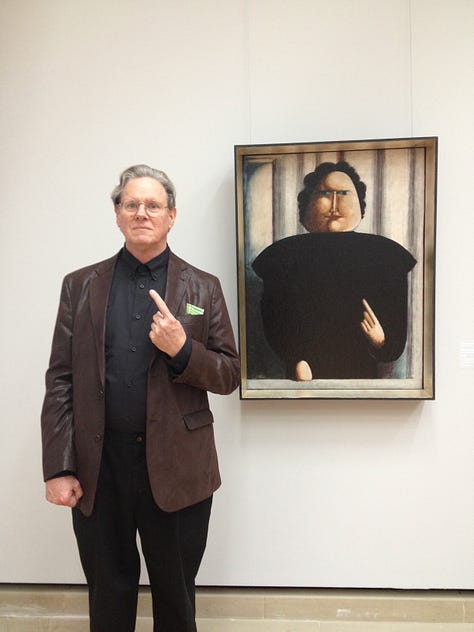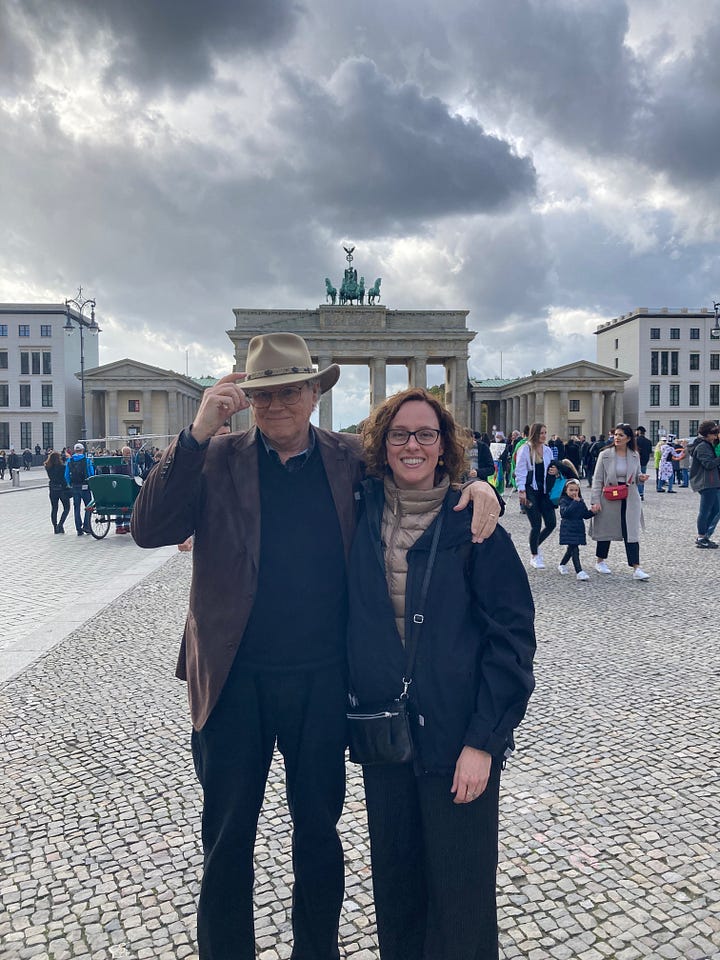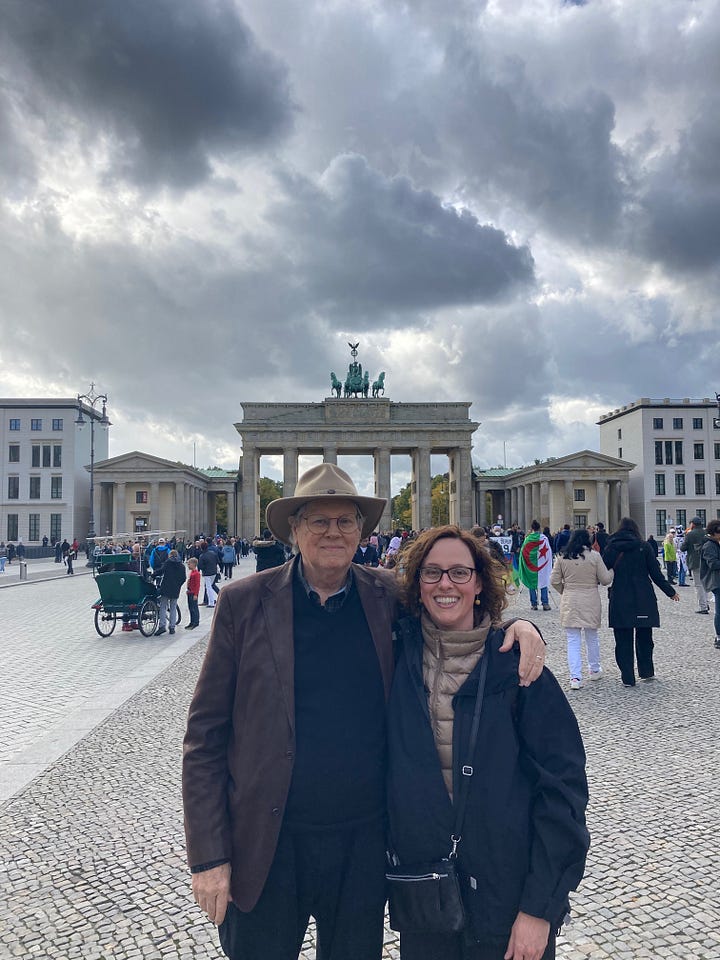A Good Kind of Sad
Contemplating my father's terminal state, reminiscing about Checkpoint Charlie
In a recent post in the ‘Free Advice Berlin’ Facebook group—where I’ve learned a lot about my adopted city—someone asked whether there were any grieving groups for ex-pats, as she was dealing with the tragedy of losing a parent. I wondered, though, is it a tragedy, life and death? At what point does a rather expected illness in an elderly person, which hastens mortality, become a tragedy? The poster also wrote, “Please don’t DM me to hit on me in this vulnerable position, it’s not gonna happen”—yet you know many have and will slide into her DMs, as the internet is a cesspool and people’s lowest natures seem given free rein online. Everyone is seeking some kind of connection, but when it’s appropriate to do so, is where we often err. Perhaps a charitable view would be that being reminded of death makes people’s sense and desire for life more acute. Grief is a strangely public and private affair.
It’s possible to grieve for someone before they have died. This I knew already before my father’s recent terminal cancer diagnosis. Several years ago, out of the blue, on a regular winter day, while running errands in the city, waves of anger, sadness, and disbelief washed over me. I had stopped by the drugstore for some rice crackers and shampoo, and as I packed up my purchases, I spotted a figure on the ground by the shopping carts. A frail old woman had fallen while trying to put the deposit coin into the slot on the handle; the cart—which she had hoped would steady her—had not. She kept repeating, “My feet are like rubber; they just gave out from under me.”
I crouched beside her, asking, “Are you injured?” She added, “I fell slowly, gently.” Her eyes are wide, white with cataracts, yet glisten with tears. Her white hair is still neatly arranged around her head and hasn’t been as disturbed as her dignity by this sudden encounter with gravity. I see my mother speaking to me, telling me she is fine—she wants to keep shopping. My own mother is alive and well, an ocean away, but I fear she too will fall while shopping or taking out the trash on a cold spring day, and then I will get the call that those of us who have made lives far away from our families dread, with increasing intensity with every passing year.
Then the call does arrive, but it’s my father’s video-calling on WhatsApp. I helped him install the app, and though it took him a year to figure it out, he seemed to love it, sending goofy selfies when he discovered the cat ears filter. It has become a way to stay close, as my father is dying, and I live nine-hour time zones away.
The pre-grieving process from abroad is underway. At first, the story was that he still had a few years, thanks to the miracles of modern medicine and Medicare. Then, this Christmas, the message arrived: only a few months. The human psyche can’t fathom a few years. It’s almost indistinguishable from a few decades in its unreality. We plan our days and weeks, yet even an hour doesn’t go as planned. Mortality is our birthright, yet one we don’t appreciate until it comes knocking. Though I haven’t known too many people who have died—one lover was taken out by cancer five years ago, but that time of my life remains somewhat obscured, like a dream—losing a parent is the most common and human experience we can have. It’s how things are supposed to go, and now that it’s my turn to experience, I am interested to see how… fascinating it is. One blessing is my father’s approach towards his own death—at least when the morphine is working—one of curiosity. This trait is contagious or hereditary; either way, I’m thankful.
My father is a priest/pastor and has been one for almost fifty years. He knows a lot of people and has influenced many lives. His imminent demise, as we somewhat humorously refer to it, is a big event. Many phone calls, letters, and emails are being written and conducted to inform and discuss the facts, feelings, and how they evolve relating to his transition. Much energy is taken up in discussions about it, which is unavoidable. There are Skype calls with my mom, FaceTime with my sister, emails back and forth, and many other channels. My father’s fellow priests working in Europe, many of whom I know, are aware and in communication. It comes up when I talk with them, as well as others.
So far, I can say that when someone is dying, they, and everyone around and close to them who knew them, can feel most alive. I’ve had many discussions with my dad’s old pals, who share tales from his and their younger years. One friend of his, who was living in Berlin in the 1970s when my dad was doing an internship in the church in the Western sector before his ordination, told me about one of his adventures crossing over into East Berlin. It was such a fun story that I asked my father for the details outlined here.
The tale goes that he was invited to visit his church’s congregation in Eastern Berlin. This required passing through checkpoint Charlie, where Westerners were required to exchange at least 20 DM Western for 20 Easter Marks (Ostmark). After an interesting and informative meeting, the local priest asked what my dad’s plans were for the rest of the day, and he said browsing bookstores was (and still remains!) his thing. So the priest gave him 120 Ostmarks, whose value was limited to the wares available in the socialist country, and he bought some nice pre-war hardbound Schiller and Goethe books. When he returned through Checkpoint Charlie, a guard noticed that he had spent more money than he had exchanged. He was taken into a little interrogation room, where he waited a long time before anyone came to question him. Time for fear to grow. But he had no fear at all. (Maybe I should have!? Wondered my dad later).
A young guard finally came and asked, “Where did you obtain the extra money?” My dad told him it was from a priest in my church. What had he done in exchange for the money? My dad said, “Nothing! He knew I was a poor seminary student interested in books and gave me money out of love. Christian love.” (It was also true that our congregations always had more Ostmarks than they needed. In East Germany, there were always so few goods to be purchased—money means nothing if there is nothing to buy.). The guard said, “I don’t believe that; it makes no sense!” Full of smiles and goodwill, my father’s reply was that the guard would never understand that the people at church would give him the money because, as communists and atheists, they couldn’t understand the concept of love, which is the essence of Christianity. The conversation went around like that for a while. Finally, the exasperated guard just scowled and went away. Fifteen minutes later, he returned and said he was free to go.
How much this story has been embellished by others in the retelling over the years is hard to say, but what is true is that my dad never misses an opportunity to proselytize and proclaim. He currently relishes recounting how he regales his oncologist with his worldview of love, karma, and reincarnation, views which assure him that when his body dies, his soul is ‘born’ into the spiritual world and will be reunited with his many friends, family and karmic cohort who are already on the ‘other side’ of the threshold of death, and with whom he will reincarnate again some distant day. He is going to meet his Maker, and he is at peace. This certainly helps me see his passing not as a tragedy but as part of the great cycle of life. Loss remains painful and doesn’t make it less sad, but a good kind of sad. Mourning is appropriate but not a feeling of tragic meaninglessness. Tragedies are based on human folly, weakness, and the sense that it could have been avoided or that an opportunity was missed.
It doesn’t seem that death from old age is a tragedy—unless you look at it in a meta kind of way—as in going back to the snake and the apple. The tragedy was that the famous First Couple ate from the Tree of Knowledge of Good and Evil and were thus banished to toil in pain and suffering on the earth and eventually death. Death is a blessing in disguise that releases us from the suffering of age and illness. If you add reincarnation to the mix, the cycle of renewal and redemption in second chances stretches over lifetimes.
My father’s news that his days are limited is sending ripple effects through the world. It’ll end in tears, not only tears of sadness but also gratitude for time well spent together. We did not always have harmonious days, but we learned a lot and laughed at every meeting. My father’s sense of humor is probably his greatest gift. He never fails to make a joke or tell one from his joke books. Over the years, when I would call him from one of my (mis)adventures abroad, college, or the Army, he would end our calls with a joke from one of his books or clipped from the Sunday funnies or the New Yorker. Always remembering to find the funny angle to any situation was and still is his top skill. Life is heavy enough as it is, so let’s practice levity.
In response to people’s reactions to his terminal status, he said his recommended mantra now is to repeat the lines from Job 1:21
“The Lord giveth and the Lord taketh away. Blessed be the name of the Lord.”
Even those of us whose mortality lies beyond the current horizon of our vision can benefit from this. He also jokes that he has a ticket out of here; the time and means of transport remain to be seen.








